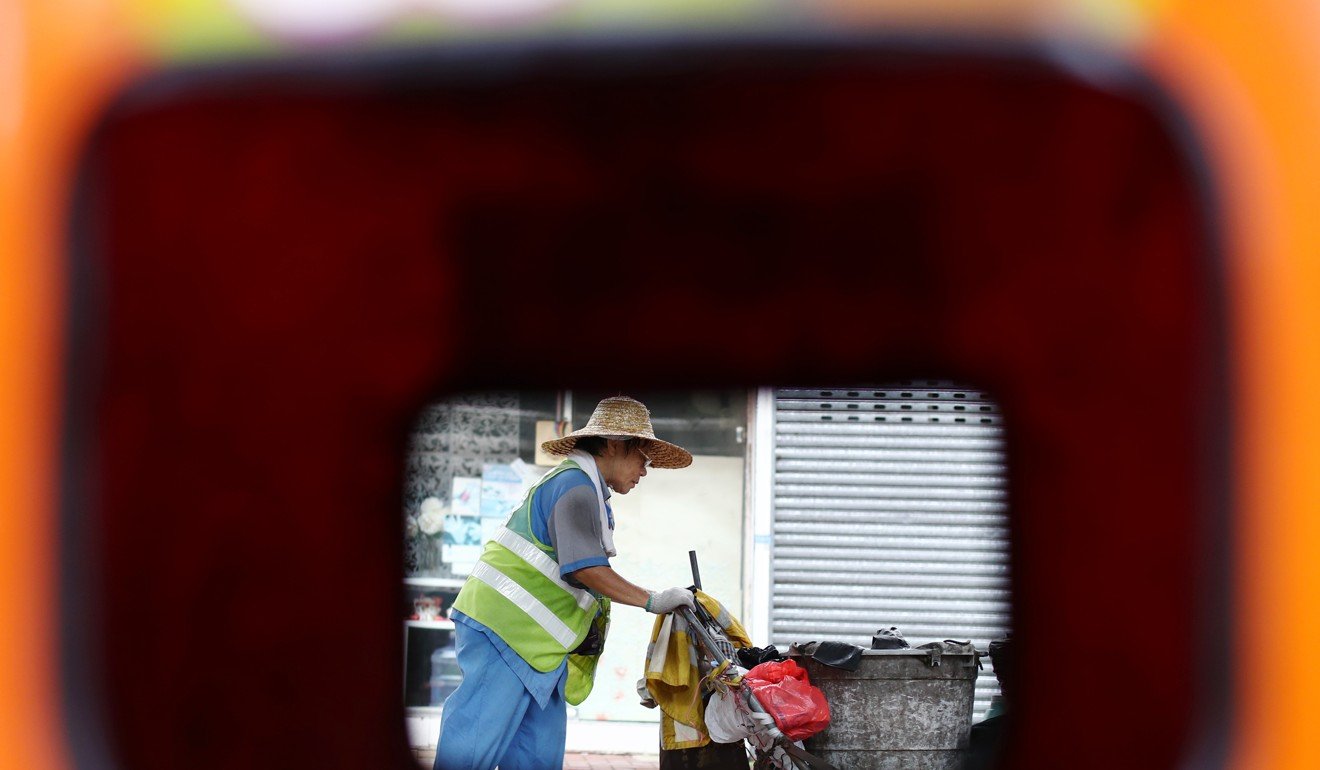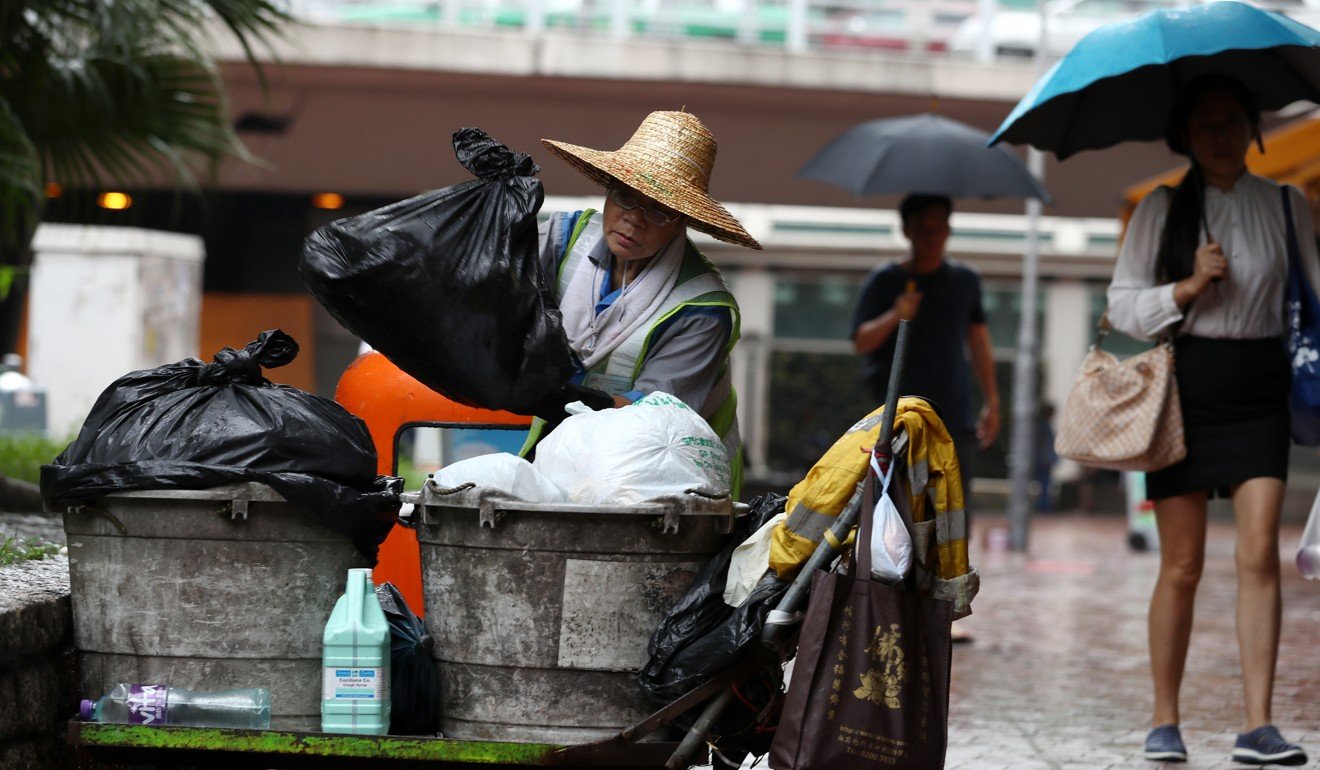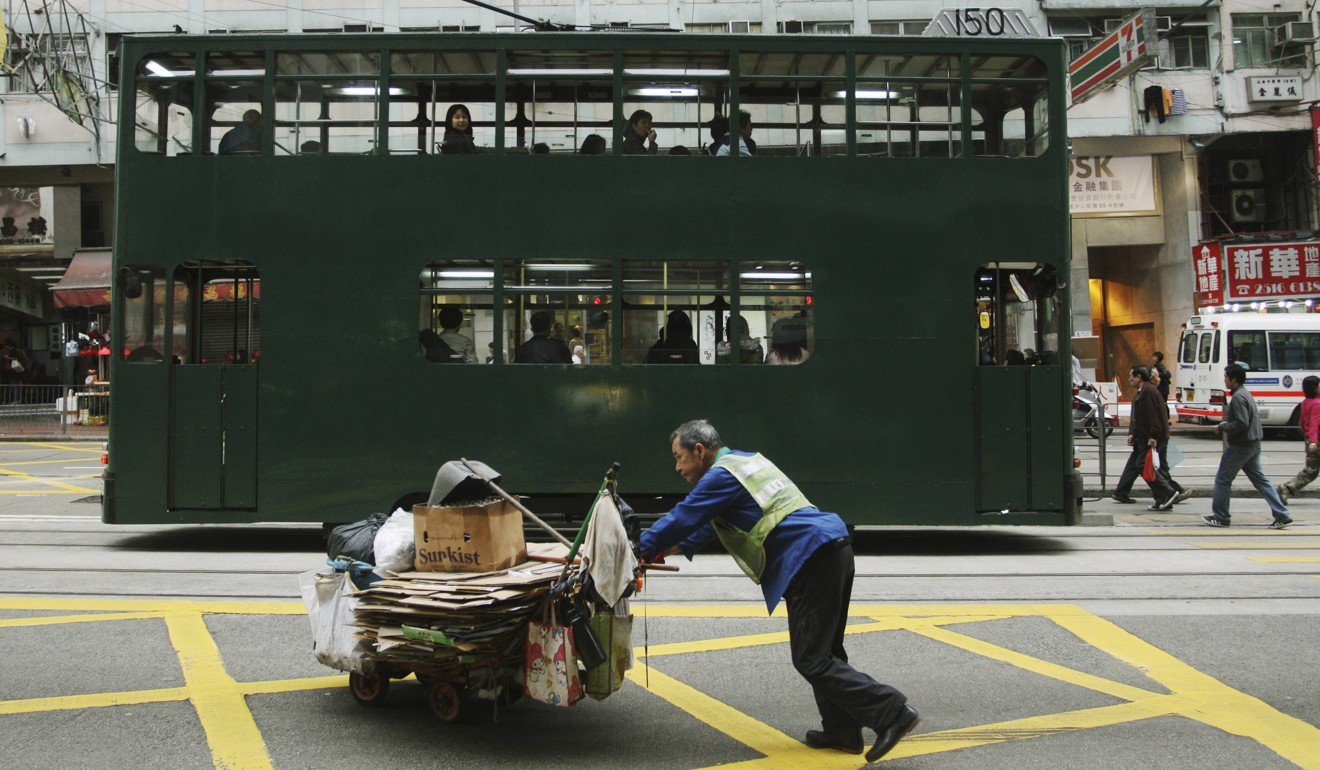
It’s a dirty job, but don’t treat them like trash: Hong Kong’s cleaners are an aged, overlooked group
Call to address stigma with low-paying, unglamorous vocation involving mostly workers between 60 and 80 years of age, and a government tender system for agencies that some see as exploitative
Hunched over her rusted trolley, 70-year-old Wang Sim-nui hobbles through an area of Tuen Mun, stopping to peek into orange public rubbish bins.
It is a wet morning and to protect herself from the rain, Wang has wrapped a white plastic bag around her head before putting on a wide-brimmed straw hat and a raincoat over her grey uniform.
“Sometimes people look down on us, but we don’t need to care too much about what others think,” says Wang lightheartedly as she goes about her job as a rubbish cleaner. Her husband, 68, is a school bus driver, and their son and daughter have settled in Australia.
“Even prostitutes stand on the streets. We have a legal job and contribute to society, why should we be afraid?”

However, some of her other family members do not think the same way. Wang refused to have her face photographed, saying that she had to “save face for her relatives” who felt embarrassed about her job.
She says one of her colleagues covers her face with a mask and sunglasses while she works, fearing that someone would recognise her.
Study reveals seven cleaning firms’ hold on 60 per cent of public housing contracts
Wang is one of Hong Kong’s 9,217 cleaners, a figure from the Food and Environmental Hygiene Department. From daybreak to late in the evening, they sweep the streets, collect rubbish, wash public toilets, and keep the city clean.
This is also an ageing army of workers, with most between 60 and 80 years old, according to the Hong Kong Women Worker’s Association. They are lowly paid and have little protection against job hazards.

Cleaners deserve respect, but their menial job suffers from discrimination and stigma, a representative from the group says.
Acknowledging this, Dr Lam Ching-choi, chairman of the Elderly Commission – a government advisory group for elderly policy – says city officials are in talks with different government departments to improve cleaners’ rights.
“It may be a pay hike, a more durable uniform, or a place for them to shower and change into a new set of clothes after work, these are all things we’re looking into,” says Lam, a member of Chief Executive Carrie Lam Cheng Yuet-ngor’s Executive Council. “I believe that if those things are revised, the stigma of cleaning work will be lifted.”
Hong Kong’s street cleaners being deprived of basic employment benefits
‘Sometimes I get bottles of urine’
Cleaner Wang, who lives with her husband in a tin shack in Tuen Mun, wakes up at 4am every day and heads out to V city shopping centre where her job is to clear 15 rubbish bins. She works at least eight hours a day, earning the minimum wage of HK$36 (US$4.59) per hour.
When the Post accompanies her on her rounds, residents come to complain, asking her to perform tasks that are not part of her work.
A woman from a nearby home for the elderly grumbles to Wang that there is a huge pile of rubbish outside the home, and it is attracting bugs.

It is not Wang’s job to clean that street, but she makes her way to the scene slowly and finds the offending spot, where there is not only rubbish but rotting food scraps scattered around.
She pulls on a pair of gloves and starts picking up fish bones and rotting meat. “Whoever put this here did not consider the feelings of the one who has to pick it up,” she says.
Many restaurants and private homes in the neighbourhood also leave their heavy rubbish with broken dishes or food leftovers at the orange public bins, instead of taking them to the larger green bins at refuse stations.
“When the bins are full, they just leave their garbage next to the bin,” she says, coming across bags of waste dripping with smelly water.
“It’s not like I don’t want to pick them up, but they are so heavy,” she says, gently stretching her forearm after lifting the bags.
When the bins are full, they just leave their garbage next to the bin
Her trolley has two grey basins which can take the waste from about three bins. Each time her basins fill up, she returns to the refuse station to lift and toss her load into the tall green dumpsters.
“I get rid of all the liquid first,” Wang says, explaining that this keeps the bags lighter. As she pours out the remnants of a one-litre bottle of sake, she says: “Sometimes, I get bottles of urine.”
Other than a foul working environment, it is common for cleaners to suffer injuries when they lift heavy objects, bend over to pick up cigarette butts, or grasp bags filled with broken glass or other sharp items.
However, most of them are not insured and receive very little protection to keep themselves safe while working. Most cleaners are employed by companies which vie for cleaning jobs outsourced by the city.
The cleaning companies usually provide workers with a pair of gloves every month, but they often tear before the next pair arrives, so workers have to dig into their own pockets if they want new gloves.
They also face unexpected hazards, such as being bullied.
Hong Kong unites behind cleaner, 71, fined HK$1,500 for pouring water on street
Cleaner Chan Kwai Chun, 61, recounted how she was punched by a minivan driver last month. The man accused her of leaving a scratch on his vehicle as she pushed her rubbish cart alongside the vehicle. He demanded compensation.
When she refused to pay, they began arguing and then exchanged blows. Both were arrested by the police for fighting. While admitting she had not handled the situation well, Chan says she feels very helpless and unprepared for similar conflicts that street cleaners faced every day.
“Look at how low and degraded we are. People bully us,” Chan says. “Only we would know the bitterness.”
A job that deserves respect
Wu Mei-lin, executive director of the association, says: “The streets don’t clean themselves. It is because of our cleaners that we’re able to maintain such a pleasant environment.
“Just because it’s a dirty job, doesn’t mean they deserve to be treated like trash.”
As of March this year, according to the Census and Statistics Department, general cleaners earned an average monthly salary of HK$9,179 (US$1,170). Those who clean public lavatories get more, HK$9,949 (US$1,267). Dishwashers are paid between 30 and 40 per cent more.
No wonder Hong Kong is finding it increasingly hard to recruit such workers at a time when the workforce is ageing.
A survey by the Hong Kong Catholic Commission For Labour Affairs, which polled 320 street cleaners employed by private contractors in 2015, found that most were over 60 years old. More than half of those surveyed were between 65 and 75 years old.
Wu says: “The cleaners I’ve worked with are mainly between 60 and 80 years old, and they need the financial stability of a job but don’t have many skills.”

That so many older people are working as cleaners also highlights the acute poverty among some of Hong Kong’s elderly.
“Those who are more able would have chosen to work as dish washers or office cleaners,” she says.
One of the reasons cleaners are poorly paid and do not even have basic employment benefits such as medical insurance lies in the system of outsourcing cleaning jobs.
About 60 per cent of the 51 public estates directly managed by the Hong Kong Housing Authority are dominated by seven management companies, which have 30 contracts involving cleaning services, according to a study by the Labour Party and Confederation of Trade Unions in January.
The government has been the biggest winner behind its outsourcing system, says Samuel Wong Kit-yip, secretary general of the Hong Kong General Union of Security and Property Management Industry Employees.
The tendering process under the outsourcing system incentivises contractors to lower their bids and maintain their market dominance by exploiting cleaning workers, he says.
Wu agrees, adding: “How do you expect the public to appreciate our cleaners when the government doesn’t even respect them?”
How do you expect the public to appreciate our cleaners when the government doesn’t even respect them
Wu says Hong Kong streets have to be swept manually at least once a day, but in the main commercial and tourist areas, they must be swept an average of four times a day, and in the busiest pedestrian areas, up to eight times a day.
Most cleaners start work at dawn to ensure the streets are clean before people begin commuting to work.
She says: “After a long day at work, they’d want to change out of the smelly, sweaty clothing they have worn all day but not all refuse rooms in Hong Kong are equipped with a changing room or storage space.”
Most cleaning companies provide cleaners with the bare minimum equipment, including only a single set of uniforms, poor quality brooms and thin gloves that barely protect their hands, she says.
“With only one uniform to wear every day, they don’t even get an alternate set if they get wet from the rain or they’re drenched in sweat.”
The Labour Party has called on the government to add tender terms stipulating that workers’ wages should be sufficient for living a decent life, and the companies should have financial reserves for dismissal payments in the invitations for bids.
Man admits shoving Hong Kong cleaner onto rail track
In the long run, the groups suggest labour laws include definitions and regulations on “joint employers” so that both the official departments outsourcing their public services and the contractors would be liable for omitting an employer’s responsibilities.
Lam from the Elderly Commission is aware of the hardships of those working in the cleaning industry and agrees their benefits should be improved.
He says he also believes available government assistance is not being delivered sufficiently to cover these elderly workers and the result is that they have to continue working.
Lam admits there are loopholes in the administration’s intervention schemes, which include the old age living allowance and the Comprehensive Social Security Assistance (CSSA) scheme, but added that changing the situation will be a long and uphill battle.
“There are those who refuse to receive financial help from the government because they feel that they’re still fit and would rather work to get the money they need,” he says. “It seems that once the elderly retire, they can only do low-level jobs, but that shouldn’t be the case.”
It seems that once the elderly retire, they can only do low-level jobs, but that shouldn’t be the case
Lam says he is pushing for the government to introduce initiatives to create a spectrum of work such as part-time and semi-volunteering jobs for the elderly.
To attract more manpower to do the cleaning work, Lam says wages for cleaners should be improved with better benefits.
“For one, the uniform of the cleaner should be of better quality, so that it will give up a fresh and professional image to the public [to change that stigma] that they are just cleaning our trash.
“Society needs to be more welcoming and allow more choices to those who are trying to re-enter the work force.”
Despite the challenges, cleaner Wang says she will continue her work as long as her health allows it, to pay the monthly rent of about HK$4,000 (US$510) for their flat.
She is staying in her hometown in Hong Kong rather than moving to Australia to rely on her son, a banker, and her daughter, a piano teacher, even if it means she has to work hard to support herself.
“My children send me money for yum cha [dim sum and tea in a restaurant], but I don’t want to use too much of their money. Their expenses in Australia are high,” Wang says. “I will work as long as I can, I have no plans to retire.
“Cleaners contribute to society. If everyone goes for high-paying jobs, I guess piles of rubbish on the streets will grow taller than a person.”


